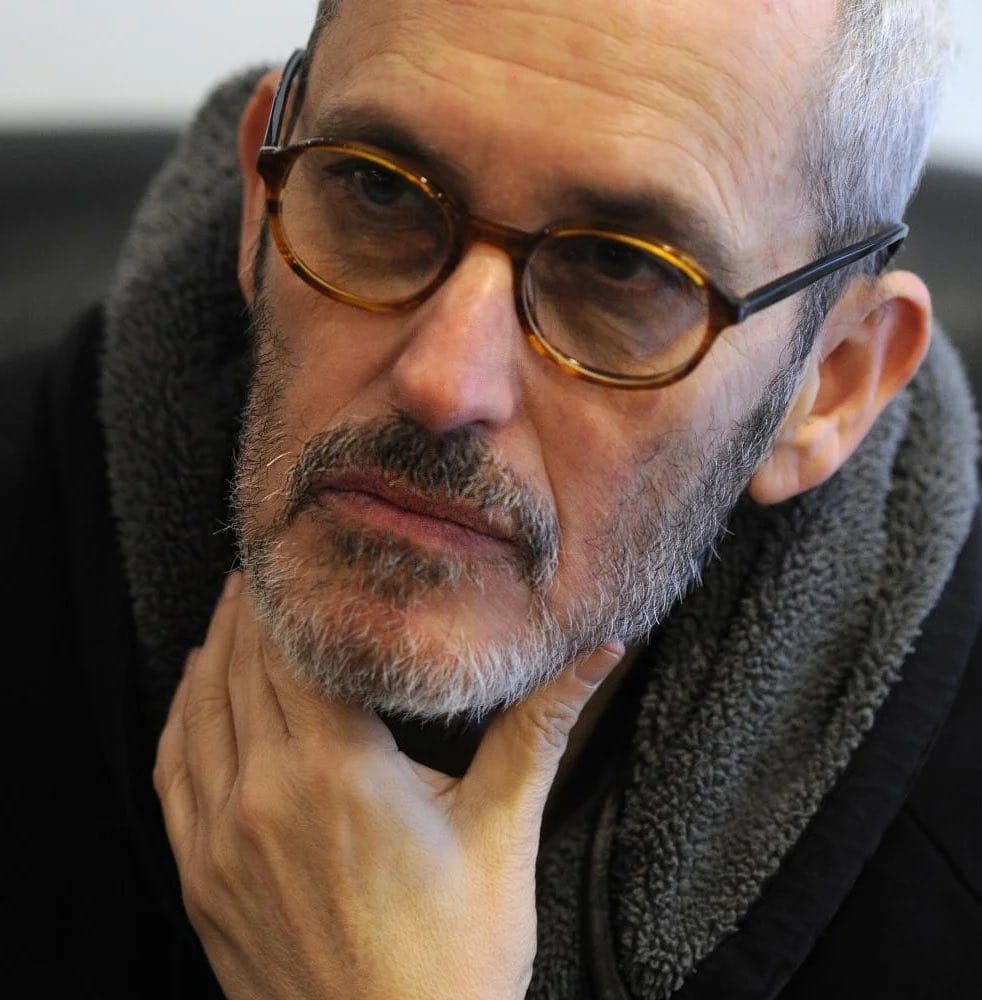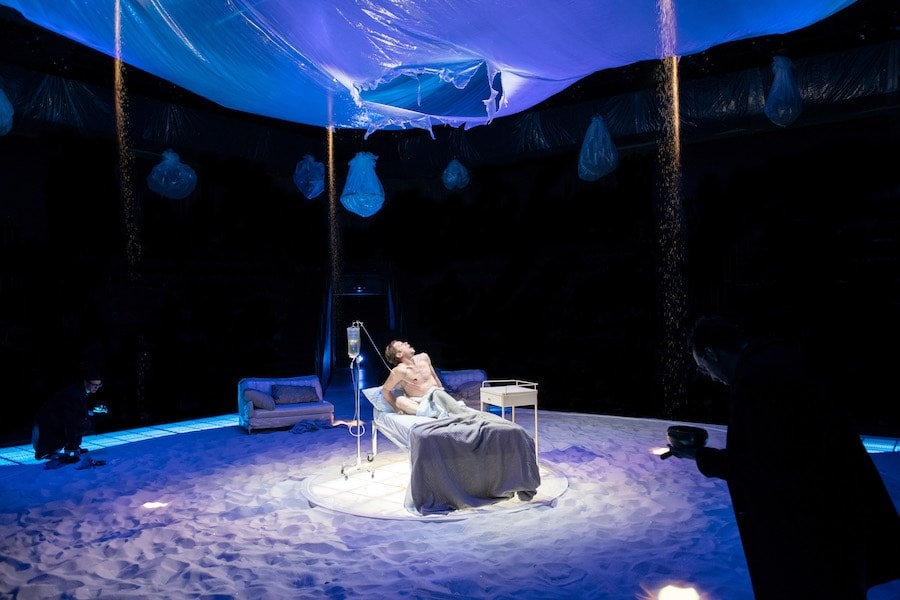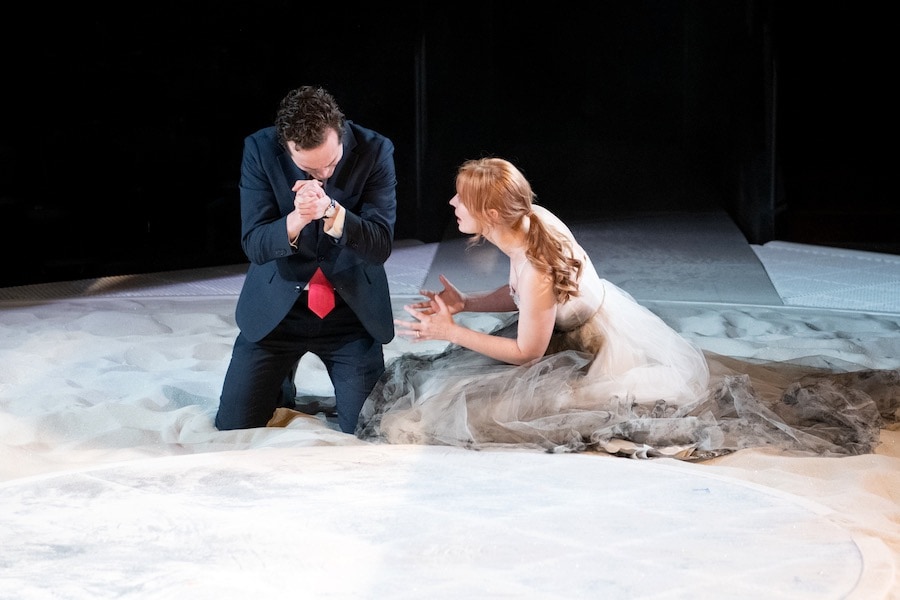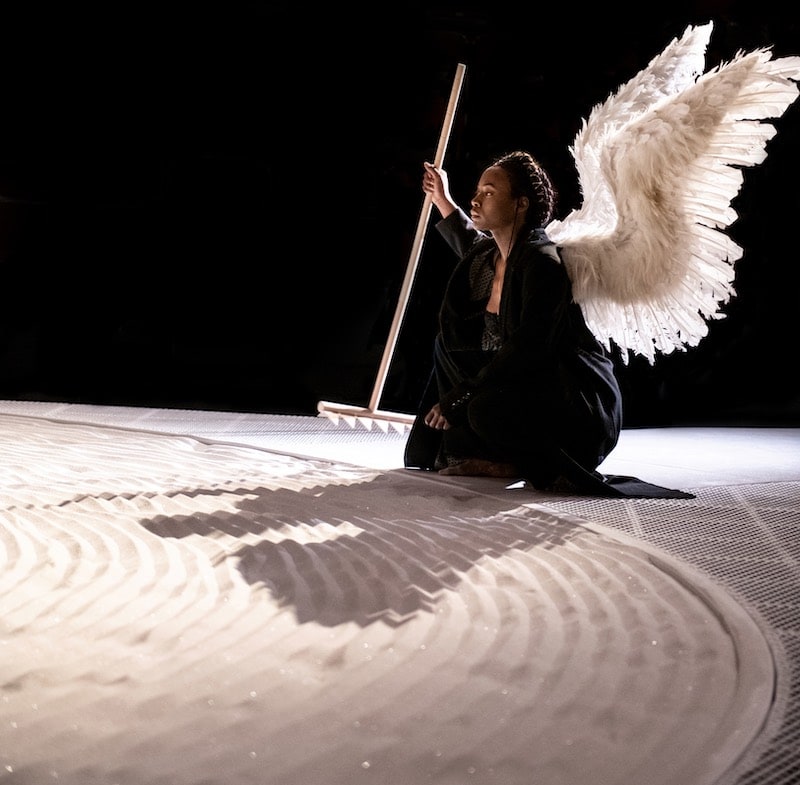I’ve seen several iterations of Tony Kushner’s masterwork Angels in America, Part One: Millennium Approaches, but the current Arena Stage production has stayed with me in a distinct and resonant way. Directed by the renowned theater and filmmaker János Szász, a Hungarian émigré, and performed in the round upon a circular expanse of white sand, the production felt to me as epochal as Peter Brooks’ legendary Royal Shakespeare Company Midsummer Night’s Dream, which he staged in a white box with actors on trapezes. As did the Brooks Midsummer, the Szász Angels transforms our understanding of a great work in a way that finds in it new truth.
So acute was my experience of this Angels in America that I wanted to find out more about the process of creating and executing it. I wanted to understand its artistry and ethos from the inside. What values went into it? What aspirations inspired it? And a week after the opening, I had the good fortune to ask my questions of the director himself.
János, as I came to know him via Zoom, was eager to talk. In the revelatory interview that followed — here edited for length and clarity — I found him to be the personification of warmth, intellect, and empathy.

John: There are so many evocations in the breathtakingly original design — the sand, the circle, the translucent plastic sheeting, which can be read as the ashes of the dead, the ineluctability of time, latex protection from infection. It’s a powerfully poetic stage picture before anybody is there. How did those ideas come to you and what did you hope they would mean to people?
János: First of all, John, it’s not only me; it’s a team of creators: Maruti Evans as set designer; Fabian Obispo, who made the sound design; Chris Akerlind with the lights; Oana Botez, the costumes; Chris De Camillis, the stage manager. For months we worked scene by scene to find a way how to do this. The circle was a given in Fichandler — a very demanding but beautiful place.
Tony Kushner’s universe is a beautiful Rubik’s cube, and from the very beginning for me it was like a long, everlasting poem. It was very, very poetic. When I began to think about how to make Angels, it was very important to say it’s a love story — a love, love, love story — not one but two or maybe three. And I wanted to do something serious about AIDS, about life and death, about the desperation and the immediate solitude and abandonment.
I understood how important was the role of ACT UP, and half a year ago I witnessed this documentary about the ashes movement — [in 1992] they poured ashes into the garden in the White House. And I just said, oh my God, it’s terrible, it’s beautiful, and this is how to show it in the theater. Then slowly with Maruti we arrived at the sand. When Tony Kushner asked me: So what is the design? I said: We are playing in the ashes of the people who died.

I sensed in performance there was a vocabulary of the sand — at so many points, actors would make a telling gesture with the sand, and it was a gesture that enriched the moment, beyond words. How did that language happen in rehearsal?
Maybe you see this better than I, because I am just following my instincts. We felt the sand as ashes and as the end of the universe, as an earthquake, as an atomic bomb. Harper is a Cassandra, Harper feels what’s going to happen. Tony Kushner is always talking about “millennium approaching,” and there is a constant shake of the earth there, and the sand serves this. We use it four or five times — shake the earth a little bit — to show Cassandra foretells something’s going to happen.
It is always a new millennium, new challenges in the world, in politics, in the universe — like what is going on in Ukraine now — so we have nervous feelings about what’s going to happen tomorrow. I think in America the sand can translate our being so nervous about how we ruin our earth. Harper knows and feels what’s going to happen. She’s working for the climate — she’s a little Greta Thunberg. And the sand and the way of the acting, which is very physical, is all try to provoke and talk in a very harsh way to the audience. We wanted to express our feelings about this drama.

I’ve seen many of the actors in the cast in other roles, but watching your Angels I was struck by their extraordinary range of physical expressiveness — beyond anything I’d seen before — something that seemed to arise from dancing figuratively and literally on a surface not solid. Would you talk about how that physical expressivity emerged in rehearsal?
I have found here a great, talented company of actors. They have been open, trustful, making huge self-sacrifice! This company of actors is a treasure, very rare. Thank God! Nick, Michael, Billie, Deborah, Ed, Justin, Susan, John — a real company of angels!
It took a long time to make the casting, because I knew that this production will need actors who want to be challenged. This is not a show for actors who are happy, lazy, and well-fed, you know? So — and this is a lot of fortune — I finally found a real company. There was no prima donna; everybody was one wish, one will. And after a week we formed a trust.
Trust is very important. Trust is the key. In the first rehearsal, I pronounce that it’s not only words, but it’s the body. The movement is important to find the feelings and express emotions through physicality — in the ashes of people who already died. So this is a bit lunacy, but I hope it is not —
It’s powerful —
Oh, you are wonderful, John.
I read an interview in the Washington Blade, a local gay newspaper, where Nick Westrate, who plays Prior Walter, said of the production, in which many in the cast are queer:
It’s so amazing to do this play with gay people — the references and understanding is there. You don’t have to apologize; the kissing isn’t weird. There’s an almost immediate intimacy of doing this play together that’s very beautiful.
—which came through so vividly in performance. Would you say more about that?
This is what I mentioned, the trust. I learned a lot. I’m a very, very curious person, so I listen, I try to understand. For me, it was very clear that I want queer people into the cast. I cannot imagine not to do this.
I must tell you, John, because this is the most important: the art has to be truthful, you know? And those actors, they know the truth about this. They and a lot of my colleagues, they know. We have made this journey together, and I love them so much. So they kiss each other, or they want to try to make love to each other. I wanted to form a love story. Many people cannot understand how queer people can love each other. They love in the same way as not-queer people. And I believe good theater can educate people who are not gay or queer that this universe is the same as yours — or maybe more beautiful, huh?
I am very touched by what you are saying.
For me, this is normality, and I’m very proud of this. My son saw the show three days ago, John, and he told me: if in Hungary we show Angels in America, it is immediately criminal, and they stop it.

There are older audiences today for Angels who lived through the 1980s AIDS crisis (as I did), and at the same time there are some younger audiences who now can know living with HIV undetectably.
Yeah.
When you were conceiving and directing this production, how did you think about those different generational relationships to Kushner’s play?
Honestly, I could not. I knew that we have an audience divided by age, so how can I serve them? Just brutal honesty, no more. We have this beautiful, brutally beautiful, truthful, strong, fiery, feverish drama as Angels in America, and we wanted to make the same in the stage. I just couldn’t think about, oh my God, we cannot to do this or that, you know? I think that we don’t do any bad, we don’t hurt anyone’s feelings in this show, and I believe deeply that we don’t.
Kushner’s script juxtaposes scenes grounded in realism with scenes hallucinated by characters. And I sensed in your conception that the entire play was already in a heightened, surreal space such that the imaginary scenes took flight all the more, and with more credibility than if they just lifted off from realism. Is that a fair take on your concept?
Yeah, it’s not realistic at all, because we are telling the story brutally about how these two couples abandon each other.
You know, theater is a ritual place where the audience comes, a cultic place. We are trying to build a design to orchestrate this story. It is a very simple show, I think, and the ritual is very important. As scenes dissolve one to another, the lights are expressing our emotions and our feelings. But basically it is simple. This is a ritual of a company which was formed here in 2023 at the Arena Stage, and we just all feel now that we don’t want to leave each other.
I’m 65, and I haven’t had a company in my life. I didn’t want any company. I was always a guest, a permanent guest — here, there, in Russia, in America, in Oslo, in Sweden, always a guest in different companies. But now I feel I found a company, and I’m very grateful to Molly Smith, who asked me to do this, because she was very brave, you know? Okay, I’m brave, actors are brave, but Molly was very brave.
I have been working in this country for eight years. I have been here in very hard times, and I’m very proud I have been here. I love this country. I love to be here. And I have a feeling that maybe I can talk about the problem in America not only as an Eastern European sees but maybe between.

Kushner’s play is profoundly prescient. It foretells a far-right takeover of U.S. politics, which I think people were shocked to hear from a 1990s play. Kushner is predicting what has now happened, and the play features a historical character, the lawyer Roy Cohn, who in life literally taught Trump how to be Trump.
Yeah.
What was on your mind when you thought about how you wanted that political resonance of the play to play today?
I hate racism. I hate it. I hate when they hate minorities. I hate if politicians are fueling hate. We have a lot of similarities, in Hungary in America, and I was dreaming about to be able to make a production which has a synchronicity with what is going on today here in America and what is going on today in Hungary and Eastern Europe. I feel I have an artistic passport to talk about your country, which is hopefully going to be mine.
And I’m very proud just sitting in the audience and listening to not only how they laugh, but I’m listening to the silence. And I see they understand fully who is Roy Cohn, who is Prior, who is Harper, what does it mean, you know? And it’s a huge parallelity with what is going on now in America.
When I learned about what Reagan did not do for a long, long time, did not do anything for those people, saying this is a gay cancer, I just couldn’t believe it; people died and he let it happen instead of feverishly looking for a medicine immediately. So here is the ACT UP and here is the ashes.
My hope in interviewing you was to let people know why this production of Angels in America must be seen no matter how many times they’ve seen the play before. And you have helped me get that story out. Thank you.
Oh, you are beautiful. I appreciate it. God bless you, John.
Angels in America, Part One: Millennium Approaches plays through April 23, 2023, in the Fichandler Stage at Arena Stage, 1101 Sixth Street SW, Washington, DC. Tickets ($56–$95) may be purchased online, by phone at 202-488-3300 (Tuesday–Sunday, 12:00-8:00 p.m.), or in person at the Sales Office at 1101 Sixth Street SW, Washington, DC (Tuesday–Sunday, 12:00-8:00 p.m.). Arena Stage offers savings programs including “pay your age” tickets for those aged 30 and under, student discounts, and “Southwest Nights” for those living and working in the District’s Southwest neighborhood. To learn more, visit arenastage.org/savings-programs.
Running Time: Three hours and 30 minutes with a 15-minute intermission.
The playbill for Angels in America is online here.
Closed captions are available via the GalaPro app.
COVID Safety: Arena Stage requires that patrons wear facial masks while in its theaters. Arena additionally recommends, but no longer requires, that patrons wear masks in the Mead Center’s large open spaces, such as the Lower Lobby, Grand Lobby, Molly Smith Study, and café area. For up-to-date information, visit arenastage.org/safety.
Angels in America, Part One: Millennium Approaches
By Tony Kushner
Directed by János Szász
CAST
Joe Pitt/Prior I Eskimo: John Austin
u/s Roy Cohn/Belize: Frank Britton
Louis Ironson: Michael Kevin Darnall
u/s Hanna Pitt/Harper Pitt/The Angel: Veronica del Cerro
Roy Cohn/Prior II: Edward Gero
u/s Joe Pitt/Louis Ironson/Prior Walter: Brandon Haagenson
The Angel/Emily/Sister Ella/Homeless Woman: Billie Krishawn
Hanna Pitt/Rabbi Henry/Ethel Rosenberg: Susan Rome
Belize/Mr. Lies: Justin Weaks
Prior Walter/Man in Park: Nick Westrate
Harper Pitt/Martin Heller: Deborah Ann Woll
CREW AND CREATIVE TEAM
Director: János Szász
Set Designer: Maruti Evans
Costume Designer: Oana Botez
Lighting Designer: Christopher Akerlind
Original Music and Sound Designers: Fabian Obispo
Wig and Makeup Designer: The Wig Associates
Dramaturg: Otis Ramsey-Zöe, Zöe Elizabeth Lillis
Stage Manager: Chris De Camillis
Assistant Stage Manager: Dayne Sundman, Leigh Robinette
Movement Coach: Joseph Pinzon
Voice and Dialect Coach: Zach Champion
Assistant Costume Designer: Calab Krieg
COVID-19 Compliance Officer: Trevor Comeau
Stage Carpenters: Hannah Martin, Sarah Schlehlein
Props: Erika Feidelseit, Alekx Shines
Light Board Operator: Kelsey Swanson
Lighting Assistant: Hayley Garcia Parnell
Audio Engineer: Lex Allenbaugh
Wardrobe Supervisor: Alice Hawfield
Wardrobe: Grace Fitzpatrick, Eli Kern, Lillian Komarow, Sinclair Alexicion Shines
Wigs, Hair, and Makeup Supervisor: Jaime Bagley
János Szász is an international film and theater director, academic, and professor. He returns to Arena Stage having previously directed A Streetcar Named Desire in 2001. Theater work in his native Hungary includes works by Brecht, Chekhov, and Shakespeare, among others. János has directed at the Royal Swedish Theatre (Stockholm), Det Norske Teatret (Oslo), Moscow Art Theatre, Bard SummerScape, and numerous productions at the American Repertory Theater, including The Seagull, Desire Under the Elms, Uncle Vanya, Marat/Sade, and Mother Courage and Her Children. His many film credits include Opium (presented at various festivals in Europe and winner of several prizes), Woyzeck (Hungarian nominee for the Oscars), The Witman Boys (official selection of the Cannes Film Festival and winner of several awards), and Eyes of the Holocaust, a documentary film about the Hungarian holocaust produced by Steven Spielberg for the Shoah Foundation. János was the Director of the Institute for Advanced Theater Training at Harvard, and at the Academy of Drama and Film in Budapest for 23 years, as a faculty member and head of the film department. He is a member of the European Film Academy and the Hungarian Academy of Science’s Department of Arts.
SEE ALSO:
Breathtaking and prophetic ‘Angels in America’ takes flight at Arena (review by Gregory Ford, April 1, 2023)




